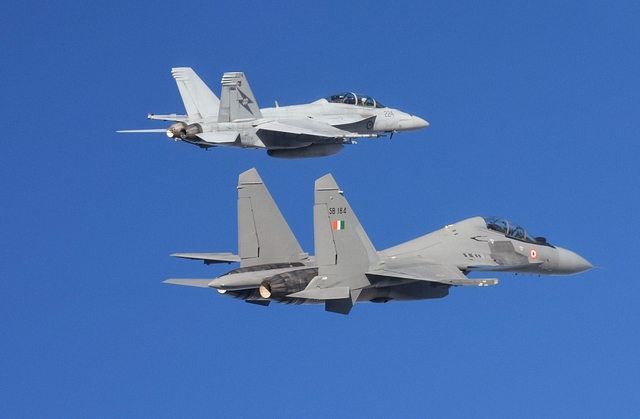
India To Hold Air Combat Exercise With US Aircraft Carrier Strike Group In The Indian Ocean
US Navy’s Ronald Regan Carrier Strike Group, which is currently in the Indian Ocean, will participate in the exercise, which will start on 23 June.
Continuing its engagement with partners in the Indian Ocean Region (IOR), India is all set to kick start a two-day air combat exercise with the US.
The US Navy’s Ronald Regan Carrier Strike Group, which is currently in the Indian Ocean, will participate in the exercise, which will start on 23 June.
Jaguar and Su-30 MKI fighters of the Indian Air Force will take part in the exercise with Phalcon and Netra early warning aircraft and IL-78 air-to-air refueller aircraft. The US Navy will be fielding its F-18 fighters and E-2C Hawkeye carrier-based airborne early warning and command and control aircraft.
“IAF has extensive experience in maritime operations in the IOR. This has been consolidated over the years by conduct of exercises from the country’s island territories, including participation in International exercises,” the Defence Ministry said in a statement released earlier today.
“This engagement with the American CSG offers one more opportunity to undertake joint operations in the maritime domain with a friendly foreign power. The exercise will focus on multiple areas, including enhancing aspects of interoperability and exchange of best practices in the maritime airpower domain,” it added.
This exercise comes just weeks after India and other Quad nations — the US, Australia and Japan — held an exercise with France in the Indian Ocean.
Earlier this year, Su-30MKIs of the IAF, armed with BrahMos supersonic cruise missiles, took part in the ongoing naval exercise with the US. The exercise gave the BrahMos-armed Su-30MKI fighters, based at the Thanjavur Air Base in Tamil Nadu, an opportunity to practice maritime strike.
The deployment of BrahMos-armed Su-30MIKs at Thanjavur has given India the option of hitting enemy targets deep in the Indian Ocean. Taking off from Thanjavur, a Su-30MKI, equipped with an air-launched BrahMos, can go right up to the Malacca Strait, a narrow maritime chokepoint between Malaysia and Singapore, that links the Indian with the Pacific Ocean and the South China Sea.
This can prove to be a headache for China —accentuate its ‘Malacca Dilemma' — if the conflict unfolding in the Himalayas escalates and expands to the maritime domain. A large part of China’s trade, including nearly 80 per cent of its oil supplies, passes through this narrow 500 nautical-mile-long waterway.
India’s exercises with partners, experts say, are aimed at sending a message to China at a time when it is behaving aggressively across the board, from the Himalayan frontier in eastern Ladakh, where its forces have clashed with India, to the South China Sea, where it has been bullying Taiwan with threats of use of force and sending its naval vessels into Japan’s territorial waters.
Last year, India invited Australia to participate in the Malabar naval exercise with the US and Japan, upgrading the war game to a quadrilateral affair in the middle of the most serious military standoff with China in over four decades.
India has also signed logistical support agreements with Australia, Japan and the US for access to the bases these countries have in the Indian Ocean.